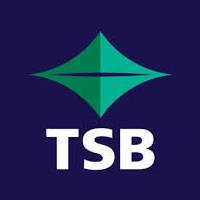Compare credit cards
We bring you the best deals and explain what to look for when choosing the right credit card for you.

Updated: 26 April 2025
The breakdown
- There are different types of credit cards in NZ, including balance transfer, interest-free, and rewards credit cards. Be sure to choose the right one for your needs.
- Paying off your credit card in full each month is always the best way to save on interest and fees, and maximise rewards.
- Credit card companies often run limited time special offers — keep an eye out and grab a great deal.
Author: Kevin McHugh, Head of Publishing at Banked.
There are a number of different kinds of credit cards available, each one suitable for different uses and types of spenders. In this guide we’ll look at each, give you options to compare and explain how to get the best deal.
Balance transfer credit cards
A balance transfer credit card lets you to pay off another card (or cards) at a lower interest rate. This makes them a great option for those who want to pay off credit card debt.
Some credit cards even have 0% interest balance transfer rates for 6 or even 12 months, with special promotions. If you still have a balance outstanding on the card at the end of this period, you will have to pay interest at the card’s standard purchase interest rate.
> Learn more about balance transfer credit cards and compare the best options in our guide
| Credit card | Balance transfer offer | Purchase interest rate (p.a.) | Annual fee | Promotions |
|---|---|---|---|---|
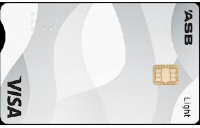 ASB Visa Light
ASB Visa Light
|
0% p.a. for 6 months | 13.50% | $0 | N/A |
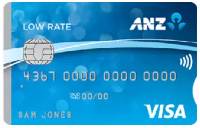 ANZ Low Rate Visa
ANZ Low Rate Visa
|
1.99% p.a. for the first two years | 13.90% | $0 | N/A |
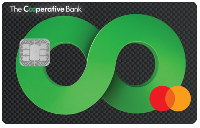 Co-operative Bank Fair Rate
Co-operative Bank Fair Rate
|
0% p.a. for 6 months | 12.95% | $20 | N/A |
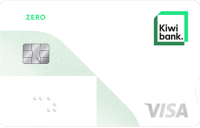 Kiwibank Zero Visa
Kiwibank Zero Visa
|
1.99% p.a. for 6 months | 12.90% | $0 | N/A |
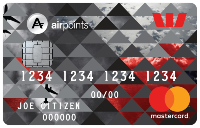 Westpac Airpoints Mastercard
Westpac Airpoints Mastercard
|
5.95% p.a. for the life of the balance. | 20.95% | $70 | Earn 1 Airpoints dollar for every $150 spent |
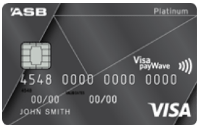 ASB Visa Platinum Rewards
ASB Visa Platinum Rewards
|
0% p.a. for 6 months | 19.95% | $80 | Earn 1 True Rewards per $100 spent, or 1 Everyday Rewards point per $1 spent |
Airpoints credit cards
Credit cards that earn Air New Zealand Airpoints as you spend are some of the most popular among Kiwis – and that shows with the selection of cards on offer. There are more than 10 credit cards that let you earn Airpoints Dollars on your spend, each with different earn rates and some with bonus Airpoints Dollars on sign up. (See our page on the best credit cards with sign-up bonuses in NZ.)
Earned Airpoints Dollars can be spent on a wide range of things, including flights and flight upgrades, purchases from the online Airpoints Mall, car rentals, and more.
Some of these cards also come with airport lounge access.
> Learn more and compare the best Airpoints credit cards in our guide.
| Credit card | Airpoints earn rate | Bonus Airpoints | Interest rate (p.a.) | Annual fee | Promotions | Learn more |
|---|---|---|---|---|---|---|
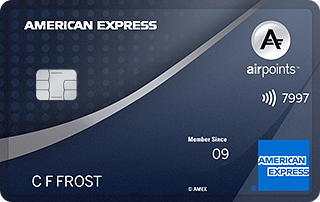 American Express Airpoints Platinum
American Express Airpoints Platinum
|
1 Airpoints Dollar per $70 | 300 (when you spend $1,500 in the first 3 months. New customers only) | 22.95% | $195 |
|
Read the review |
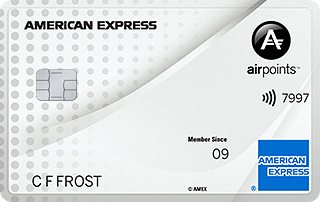 American Express Airpoints
American Express Airpoints
|
1 Airpoints Dollar per $100 | 50 | 22.95% | $0 |
|
Read the review |
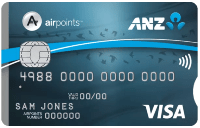 ANZ Airpoints Visa
ANZ Airpoints Visa
|
1 Airpoints Dollar per $170 | 0 | 20.95% | $65 | None currently | |
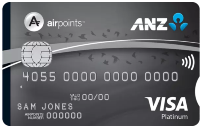 ANZ Airpoints Visa Platinum
ANZ Airpoints Visa Platinum
|
1 Airpoints Dollar per $110 | 0 | 20.95% | $150 |
|
|
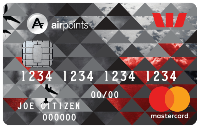 Westpac Airpoints Mastercard
Westpac Airpoints Mastercard
|
Earns 1 Airpoints Dollar per $150 spend up to $3,500 each month, then 1 Airpoints Dollar per $300. | 0 | 20.95% | $70 | None currently | |
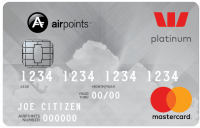 Westpac Airpoints Platinum Mastercard
Westpac Airpoints Platinum Mastercard
|
Earns 1 Airpoints Dollar per $75 spend up to $7,000 each month, then 1 per $150. | 0 | 20.95% | $125 |
|
|
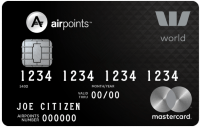 Westpac Airpoints World Mastercard
Westpac Airpoints World Mastercard
|
Earns 1 Airpoints Dollar per $65 spend up to $15,000 each month, then 1 per $130. | 0 | 16.95% | $310 |
|
Rewards credit cards
If Airpoints aren’t for you, other credit cards will let you earn points you can redeem on your shopping, give you discounts on your petrol, or even just give you back a percentage of how much you’ve spent.
Rewards schemes including True Rewards and hotpoints all have credit cards through which you can earn when you spend.
Rewards credit cards are a big topic so we created a separate guide for it.
> Compare all rewards credit cards in our guide.
Cashback credit cards
A cashback reward might be the most straightforward way to get rewarded for spending on your credit card. Instead of earning points that can often only be used for a limited selection of purchases, a cashback card simply refunds a portion of money you’ve spent back.
However, there are a smaller selection of cashback credit cards than some other types and the earn rate is often not as good as some Airpoints or other rewards cards.
| Credit card | Cashback earn rate | Purchase interest rate (p.a.) | Annual fee | Benefits |
|---|---|---|---|---|
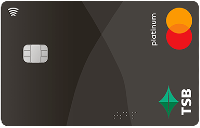 TSB Platinum Mastercard
TSB Platinum Mastercard
|
$1 for every $100 | 20.95% | $90 |
|
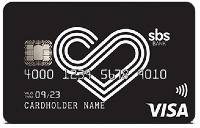 SBS Visa
SBS Visa
|
$1 for every $150 | 19.65% | $0 | None currently |
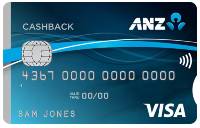 ANZ Cashback Visa
ANZ Cashback Visa
|
$1 for every $150 | 20.95% | $40 | None currently |
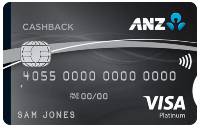 ANZ CashBack Visa Platinum
ANZ CashBack Visa Platinum
|
$1 for every $120 | 20.95% | $80 | None currently |
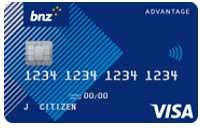 BNZ Advantage Visa Classic
BNZ Advantage Visa Classic
|
$1 for every $150 (via BNZ Rewards) | 20.95% | $40 | None currently |
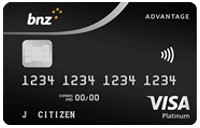 BNZ Advantage Visa Platinum
BNZ Advantage Visa Platinum
|
$1 for every $90 (via BNZ Rewards) | 18.95% | $90 |
|
Credit cards with complimentary travel insurance
A key perk for many, all of the major credit card providers offer at least one credit card that comes with complimentary travel insurance. This means there is no shortage of choice.
These cards tend to be more premium and offer travel insurance as one of several perks. For this reason, many credit cards that offer complimentary travel insurance also offer rewards for spending on the card.
Compare your options below, or read our complete guide on credit cards with travel insurance to help you choose the best.
If you’re looking for the right prepaid travel card, compare travel money cards with our guide. Alternatively, check out our guide to the best travel credit cards.
| Credit card | Coverage | Key policy details | Annual fee | Other features | Learn more |
|---|---|---|---|---|---|
 American Express Airpoints Platinum
American Express Airpoints Platinum
|
International and domestic travel |
|
$195 |
|
Read the review |
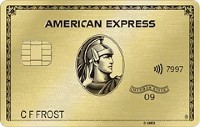 American Express Gold Rewards Card
American Express Gold Rewards Card
|
International and domestic travel |
|
$200 |
|
Read the review |
 ANZ Airpoints Visa Platinum
ANZ Airpoints Visa Platinum
|
International only |
|
$150 |
|
|
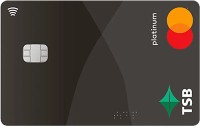 TSB Platinum Mastercard
TSB Platinum Mastercard
|
International and domestic travel |
|
$90 |
|
|
 BNZ Advantage Visa Platinum
BNZ Advantage Visa Platinum
|
International only |
|
$90 |
|
|
 ASB Visa Platinum
ASB Visa Platinum
|
International only |
|
$80 |
|
|
 Westpac Airpoints Platinum Mastercard
Westpac Airpoints Platinum Mastercard
|
International only |
|
$125 |
|
|
 Westpac Airpoints World Mastercard
Westpac Airpoints World Mastercard
|
International only |
|
$310 |
|
|
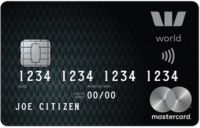 Westpac hotpoints World Mastercard
Westpac hotpoints World Mastercard
|
International only |
|
$285 |
|
|
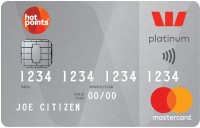 Westpac hotpoints Platinum Mastercard
Westpac hotpoints Platinum Mastercard
|
International only |
|
$70 |
|
|
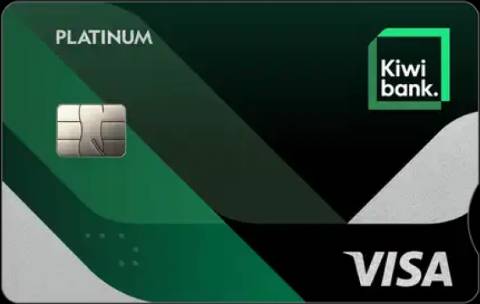 Kiwibank Platinum Visa
Kiwibank Platinum Visa
|
International only |
|
$50 | N/A |
Interest-free credit cards
Interest-free, or 0% purchase credit cards let you spend on your credit card and not pay any interest for a period of time.
Some credit cards offer 0% interest on all purchases for a period of time, usually 3 to 6 months. Others offer long-term interest free finance of up to 24 months at particular retailers.
> Learn more and find the best interest-free credit cards deals available.
| Credit card | Interest-free offer | Long-term, interest free finance deals | Interest rate (p.a.) | Annual fee | Promotions | Learn more |
|---|---|---|---|---|---|---|
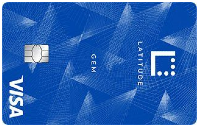 Gem Visa
Gem Visa
|
6 months interest free on all purchases $250 and over. | Up to 2 years interest-free on purchases from brands including Target, Helloworld Travel and Mitre 10. | 29.49% | $65 | None currently | More on the Gem Visa |
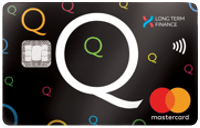 Q Mastercard
Q Mastercard
|
3 months interest on all purchases, no minimum spend. | Up to 4 years interest-free on purchases from brands including Harrisons, PB Tech and Michael Hill. | 28.95% | $50 | Varies | More on the Q Mastercard |
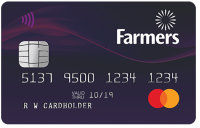 Farmers Mastercard
Farmers Mastercard
|
N/A | Up to 2 years interest-free on purchases from brands including Farmers, JB Hi-Fi and House of Travel. | 28.50% | $50 |
|
More on the Farmers Mastercard |
 Flight Centre Mastercard
Flight Centre Mastercard
|
N/A | Up to 2 years interest-free on purchases from brands including Flight Centre, JB Hi-Fi and Evolution Cycles. | 24.99% | $50 |
|
More on the Flight Centre Mastercard |
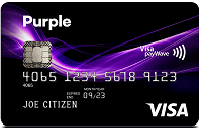 Purple Visa
Purple Visa
|
N/A | 1 year interest free at Noel Leeming ,Torpedo 7, or The Market. Long-term finance deals also at the Warehouse | 26.65% | $55 |
|
More on the Purple Visa |
Credit cards with no annual fee
No-annual-fee (or ‘free’) credit cards don’t include a regular fee for having the card, as many other types of cards do.
The trade-off is that they also typically don’t have the added reward or perks that some types of cards do (although there are exceptions).
Credit cards with no annual fee can be a sensible choice for light users, or those who just want a card as backup.
> Compare your options below or learn more about no-annual-fee credit cards in our full guide.
| Credit card | Interest rate (p.a.) | Annual fee | Rewards | Perks | Learn more |
|---|---|---|---|---|---|
 American Express Airpoints
American Express Airpoints
|
22.95% | $0 | 1 Airpoints Dollar per $100 spent |
|
Read the review |
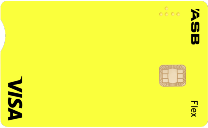 ASB Visa Flex
ASB Visa Flex
|
9.95% | $0 | None | None | |
 ASB Visa Light
ASB Visa Light
|
13.50% | $0 | None |
|
|
 Westpac Fee Free Mastercard
Westpac Fee Free Mastercard
|
12.90% | $0 | None |
|
|
 Kiwibank Zero Visa
Kiwibank Zero Visa
|
12.90% | $0 | None |
|
|
 SBS Visa
SBS Visa
|
18.5% | $0 | $1 cashback for every $150 spent | None | |
 ANZ Low Rate Visa
ANZ Low Rate Visa
|
13.90% | $0 | None |
|
Low-rate credit cards
Low-rate cards are simply credit cards that have a lower interest rate than most other credit cards. These usually charge around 10% to 13% on purchases. Some also have a lower rate than average on cash advances.
It’s rare that this type of card offers rewards, but they can be a great choice if you usually don’t pay off your credit card balance in full each month.
What is a credit card?
A credit card is a way of paying for something straight away without using your own money. When you pay for something with a credit card, the card issuer is essentially lending you the money and you have to pay it back later.
A credit card lets you spread the cost of purchases over time. You will be charged interest on the money you owe, unless you pay off your card within a specified period of time (usually 44 to 55 days, depending on the credit card provider).
Credit card interest explained
We explain what kind of transactions you will be charged interest on, how you will be charged, and what interest-free days are.
The types of credit card interest
There are three types of interest you can be charged for using a credit card:
- Purchase interest: The interest charged on any purchase you make on the card. Depending on the card, this can range from 10% to 28% per year, or ‘per annum’ (p.a.).
- Cash advance interest: The interest charged when you either draw money out from an ATM, buy a cash substitute (such as a gift card), or use your card for gambling. This is usually higher than a card’s purchase interest rate and can vary from 10% to 29% per year.
- Balance transfer interest: The interest charged on any balance transferred over to the card. Note that not all credit cards let you transfer a balance from another card. Balance transfer interest rates vary from 0% for a limited time, up to around 1.99% for 2 years.
How interest is charged on your credit card
Interest on transactions you make accumulates (but is not charged) on a daily basis. This means that you will collect a little more interest on a purchase made at the start of your statement period than one made towards the end.
But remember: If you pay the outstanding balance of your credit card in full each month, you won’t pay any interest, no matter when your transactions were made. This is because you paid off within the interest-free period available to you.
Interest-free days
All credit cards have an interest-free period for transactions, which will be either up to 44 or 55 days, depending on the card provider. This doesn’t include special interest-free credit cards which can have much longer periods.
The ‘up to’ part is very important as the exact number of interest-free days you have will depend on when you make the transaction within your statement period.
Here’s an example of how it works with a credit card that offers 55 interest-free days:
- 1 September — the start of your statement period: You make a purchase.
- 30 September: Your credit card statement for the month is created. Your statement explains how much you owe and the due date.
- 25 October — the end of your statement period: Your payment due date.
If you paid the full amount owing on your card by the due date, you would take advantage of all 55 interest-free days and would have no interest to pay. If you only made a minimum payment, the full interest accumulated during that 55-day period would be charged.
Credit card fees explained
While credit cards may have lots of possible fees, depending on how you use your credit card, you may not be charged many (or any) of them.
These are some of the most common credit card fees:
- Annual fee: Many credit cards include an annual fee for the use of the card. Annual fees can range from $20 to over $1,000 (see the American Express Platinum card). They are either charged in one go when you sign up for the card (and each year thereafter), or they’re broken down into 2 payments, 6 months apart.
- Joint account fee: Most credit card companies will charge a fee for sharing the credit card account with another cardholder. This fee will range from $10 to $30 each year per extra cardholder.
- Cash advance fee: As well as attracting a higher rate of interest, some credit card companies will charge a fee for withdrawing cash or similar from your credit card. Banks will often charge more for withdrawing from a teller instead of using an ATM. Fees can range from less than $1 to $3.
- Currency conversion fee: Nearly all credit cards will charge you a fee if you use your card abroad or if you buy something online in another currency. These fees fluctuate, but they are typically around 1-2% of the value of the transaction.
If you’re looking you use your card while you’re abroad, you will likely be better off with a prepaid travel money card or travel credit card. - Late payment fee: If you don’t make at least the minimum payment by your credit card’s due date, you will be hit with this charge. Late payment fees range from $5 to $10.
Are you eligible for a credit card?
Credit card companies have their own criteria for deciding who they will give a credit card to, but there are some standard requirements most applicants will have to meet.
- You must be 18 or over.
- You must be a New Zealand citizen or a permanent resident: American Express and ANZ will also accept applications from temporary residents with relevant visas.
- You must meet a minimum credit history requirement: This minimum requirement will vary from bank to bank and card to card. Unlike in some other countries, New Zealand banks don’t publicise the minimum credit score required to be granted a card.
- You must meet a minimum income requirement: Again, most credit card companies sadly don’t advertise what this requirement is.
How credit card companies are regulated in New Zealand
Credit cards fall under the Credit Contracts and Consumer Finance Act (CCCFA).
The law aims to protect people in a number of ways, including by ensuring:
- Consumers are aware of what they are signing up for
- Consumers can request changes to a credit contract if they’re suffering financial hardship
- That interest rates and fees are not excessive.
What to do if you have a problem with your credit card company
If you think your credit card company has acted unfairly or unlawfully, these are the steps you can take.
1. Try to resolve it with your credit card company
Your first step is attempting to come to some kind of resolution directly with your credit card company.
2. Complain to the relevant dispute resolution scheme
All credit card companies in New Zealand must legally be members of a dispute resolution scheme. These schemes are fair and independent and can help you resolve the problem with your credit card company.
Not all credit card companies are members of the same scheme. Each credit card issuer and the dispute resolution scheme they are a part of can be found below.
| Credit card issuer | Dispute resolution scheme |
|---|---|
| Banking Ombudsman Scheme |
| Insurance & Financial Services Ombudsman Scheme |
| Financial Services Complaints Ltd. |
3. Make a report to the Commerce Commission
The Commerce Commission enforces the CCCFA and investigates companies that don’t comply.
However, the Commerce Commission is concerned with the best outcome for all New Zealanders and so won’t fight for you specifically. It may not even investigate your case in particular if they don’t feel it’s part of a wider problem.
Alternatives to a credit card
A credit card can be a very useful financial tool for everyday spending, paying off some forms of debt, earning rewards and more. But depending on your needs, there may be an alternative that saves you money.
Buy now, pay later
Services like Afterpay, Laybuy and Humm have exploded in popularity in New Zealand. They provide easy access to credit and let users pay off small-to-medium purchases, interest-free, over a period of weeks or months.
These buy now, pay later (BNPL) services are accessible and easy to use, but they carry late fees that can be substantial relative to the amount of money spent. This makes them a problematic credit option, and they must be used wisely.
Personal loan
A personal loan can be a strong choice if you need to fund a bigger expenditure. Whether you want to buy a new car, renovate your kitchen, or something else, you will likely get a better interest rate with a personal loan than a credit card.
It’s also more likely that you will be able to borrow more from a bank or other lender than what’s available on your credit card.
> Find out more and compare loans in our guide.
Debt consolidation loan
Using a loan to consolidate debt can be a good idea if you are struggling to manage other debts with higher interest rates.
But if your debt is only on credit cards, a balance transfer credit card is likely a better option. The interest rate on a balance transfer credit card is likely to beat that of any debt consolidation loan, especially if you get a 0% deal for a period of time in which you can pay off the debt.
> Learn more about debt consolidation loans and compare options.
Which companies offer credit cards in New Zealand?
Here is a breakdown of all companies that currently offer credit cards, and the types of cards they offer.
| Company | Cards they offer |
|---|---|
American Express | Offers a range of cards, from the American Express Airpoints card with no annual fee, to the top-tier, rewards-laden Platinum card. American Express specialises in cards that offer Airpoints Dollars and its cards have the best earn rates around. Our Head of Publishing found out how widely AMEX credit cards are accepted in our latest guide. Check out our guide to choosing the best American Express credit card. |
ANZ | As you’d expect from the country’s biggest bank, ANZ has a selection of cards to suit most needs. Options include a low-rate visa and a cashback rewards card. |
ASB | From the low-rate Visa Flex to the Platinum Rewards Card, ASB has a good selection of cards. The bank has its own rewards schemes that let customers earn either True Rewards or Everyday Rewards at a number of partner stores. |
BNZ | BNZ has 4 cards available suitable for different needs. Some BNZ cards let customers collect BNZ Rewards on their spend. |
The Co-Operative Bank | The Co-operative Bank has just one credit card available: the Fair Rate card which has a low purchase interest rate and 0% on balance transfers for 6 months. |
FlexiGroup | The FlexiGroup name probably won’t sound familiar, but their card brands might. With the Farmers, Flight Centre and Q Mastercards, Flexigroup specialises in interest-free, long-term finance credit cards. |
Gem Finance | Gem Finance has just one credit card available in New Zealand. The Gem Visa offers 6 months of interest-free finance on all Visa purchases over $250. |
Kiwibank | New Zealand’s own Kiwibank offers cards ranging from the low-rate Zero Visa with no annual fee, to the Platinum Visa. |
SBS Bank | SBS has 1 credit card available to Kiwi consumers: the SBS Visa Credit Card. The bank no longer offers the SBS Pink Ribbon Visa. |
TSB | TSB just has the Classic credit card available, offering 0% on balance transfers for 6 months. |
Westpac | Westpac has the widest selection of credit cards of all companies. The Westpac card selection covers everything from low-rate and Airpoints cards, to cards with the bank’s own hotpoints rewards scheme. |















